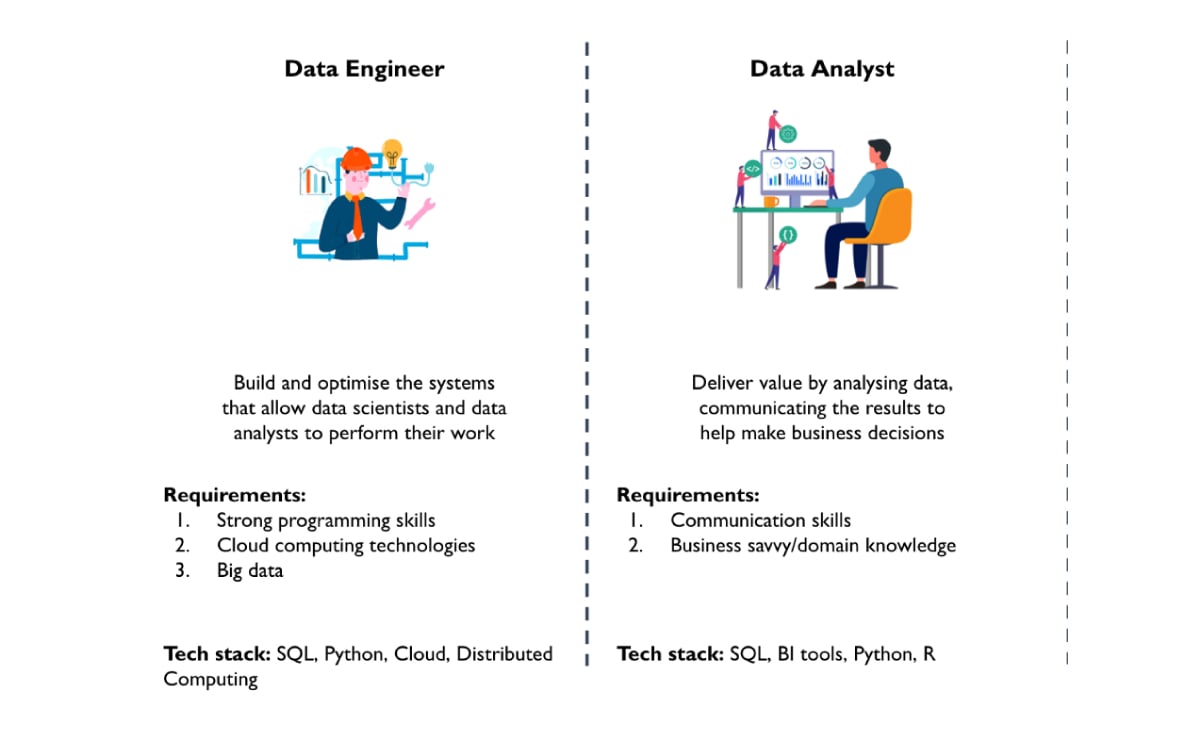The roles of a Database Administrator (DBA) and a Data Analyst are distinct but often complementary within an organization. Here’s a breakdown of the key differences between the two:
Database Administrator (DBA)
Definition
A DBA is responsible for managing and maintaining an organization's database systems, ensuring their performance, security, and availability.
Key Responsibilities
- Database Design :
Creating and implementing database structures based on organizational needs.
- Performance Monitoring :
Monitoring and optimizing database performance, including indexing and query tuning.
- Backup and Recovery :
Implementing backup strategies and recovery plans to safeguard data.
- Security Management :
Setting user permissions and implementing security measures to protect sensitive data.
- Maintenance :
Performing routine maintenance tasks, such as updates, patching, and troubleshooting issues.
- Capacity Planning :
Estimating future database storage needs and planning for growth.
Skills Required
- Proficiency in database management systems (e.g., Oracle, MySQL, SQL Server).
- Strong knowledge of SQL and database design principles.
- Understanding of performance tuning and optimization techniques.
- Familiarity with backup and recovery solutions.
- Security management skills.
Data Analyst
Definition
A Data Analyst focuses on interpreting and analyzing data to help organizations make informed decisions. They extract insights from data and present them to stakeholders.
Key Responsibilities
- Data Collection :
Gathering data from various sources, including databases, spreadsheets, and external data sets.
- Data Cleaning :
Preprocessing and cleaning data to ensure accuracy and reliability.
- Analysis :
Analyzing data using statistical methods and tools to identify trends, patterns, and insights.
- Reporting :
Creating reports, dashboards, and visualizations to communicate findings to stakeholders.
- Collaboration : Working with other departments to understand their data needs and provide analytical support.
Skills Required
- Proficiency in data analysis tools (e.g., Excel, SQL, R, Python).
- Strong analytical and problem-solving skills.
- Ability to create visualizations and reports using tools like Tableau or Power BI.
- Understanding of statistical methods and data interpretation.
- Good communication skills for presenting findings.
Summary of Differences
| Feature | Database Administrator (DBA) | Data Analyst |
|---|
| Primary Focus | Database management and maintenance | Data interpretation and analysis |
| Responsibilities | Design, optimize, secure, and maintain databases | Collect, clean, analyze, and report data |
| Technical Skills | SQL, database management systems, performance tuning | Data analysis tools, statistics, reporting |
| Role in Organization | Ensures data is stored securely and efficiently | Provides insights to drive decision-making |
| Interaction with Data | Manages the infrastructure of databases | Interacts with data to extract insights |
Conclusion
While DBAs ensure the proper functioning and security of databases, Data Analysts focus on extracting insights from the data stored within those databases. Both roles are essential for effective data management and decision-making within an organization.





0 Comments
I really appreciate for your words. Thank you very much for your comment.